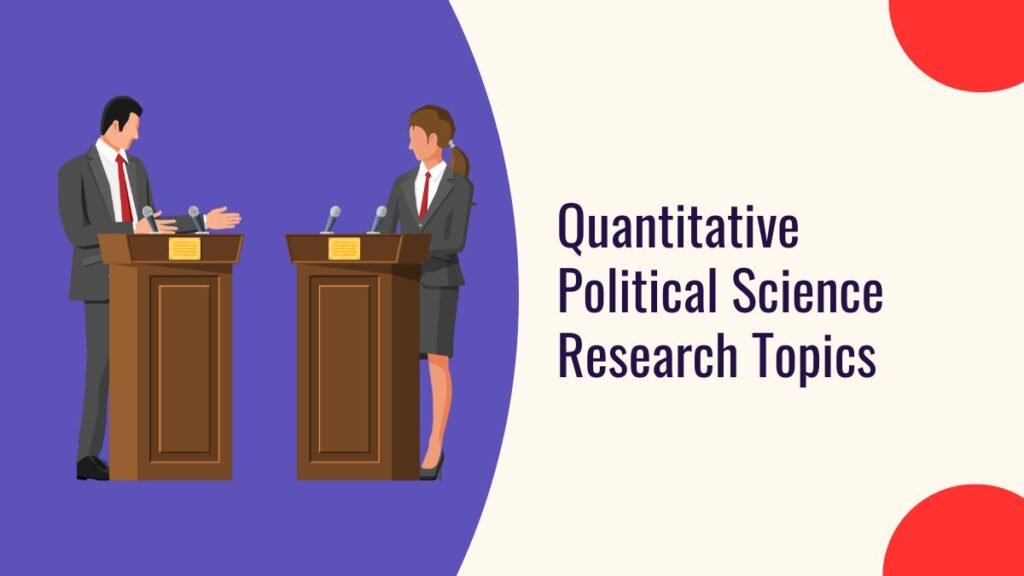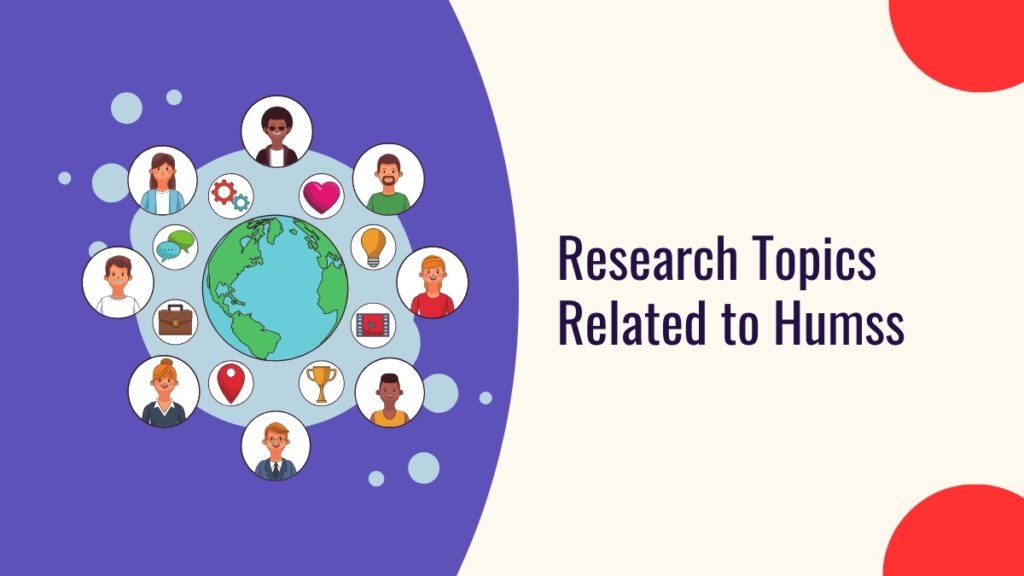Explore engaging and relevant quantitative political science research topics. Discover how to analyze voter behavior, campaign financing, public opinion, and more. Find methods, examples, and tips to choose the perfect topic for your research.
Quantitative political science employs statistical methods and mathematical models to analyze political phenomena. This approach allows researchers to uncover patterns, test theories, and draw conclusions based on numerical data.
As the political landscape becomes increasingly complex, quantitative methods are essential for understanding electoral behavior, policy outcomes, and international relations. This article explores why quantitative research matters and provides a rich list of research topics to inspire students in their studies.
Quantitative Political Science Research Topics PDF
Why Choose Quantitative Methods?
Check out the key reasons for not to choose quantitative methods:-
| Aspect | Description |
|---|---|
| Objective Analysis | Quantitative research offers a systematic approach to understanding political phenomena, reducing bias through statistical methods. |
| Generalizability | Findings from quantitative studies can often be generalized to larger populations, enhancing the relevance of research. |
| Theory Testing | This approach allows researchers to test existing theories or develop new ones using empirical data. |
| Data-Driven Insights | Quantitative methods can reveal trends and correlations that qualitative approaches might overlook. |
| Policy Implications | Results can inform policymakers by providing evidence-based recommendations for action. |
Tips for Selecting Research Topics
Check out the best tips for selecting research topics:-
| Step | Description |
|---|---|
| Identify Your Interests | Consider what aspects of political science intrigue you the most. |
| Examine Current Events | Look for topics in the news that could benefit from quantitative analysis. |
| Review Existing Literature | Explore gaps in research that you can address with quantitative methods. |
| Consult with Professors | Seek guidance from advisors who can help refine your topic. |
| Consider Data Availability | Ensure you can access the necessary data to conduct your analysis. |
200+ Quantitative Political Science Research Topics
Check out 200 quantitative political science research topics:-
Electoral Behavior
- The impact of voter turnout on election outcomes.
- Analyzing the effects of social media on voter mobilization.
- The relationship between demographics and voting patterns.
- How economic indicators influence electoral choices.
- The effects of campaign financing on election results.
- The role of incumbency in electoral success.
- Voter behavior in response to negative campaigning.
- Examining the impact of voter ID laws on turnout.
- The influence of party affiliation on voter decision-making.
- Regional differences in voting behavior across the U.S.
Public Opinion
- Trends in public opinion on climate change.
- The relationship between media consumption and political beliefs.
- Analyzing shifts in public attitudes towards immigration.
- The impact of major events on public sentiment.
- Measuring the effects of political advertisements on public opinion.
- The role of identity politics in shaping public opinion.
- Public perceptions of government effectiveness.
- Exploring partisan divisions in public health attitudes.
- The influence of grassroots movements on public opinion.
- Trends in trust in government over time.
Policy Analysis
- Evaluating the effectiveness of minimum wage policies.
- The impact of healthcare reform on public health outcomes.
- Analyzing the economic effects of tax cuts.
- The relationship between crime rates and gun control policies.
- Assessing the impact of environmental regulations on pollution levels.
- The effects of education policy changes on student performance.
- Analyzing the relationship between welfare policies and poverty rates.
- The impact of foreign aid on economic development.
- Evaluating the success of public transportation initiatives.
- The relationship between political ideology and policy outcomes.
International Relations
- The effects of trade agreements on diplomatic relations.
- Analyzing the relationship between military spending and national security.
- The impact of international sanctions on state behavior.
- Measuring the effects of globalization on national sovereignty.
- The relationship between democratization and economic development.
- Analyzing patterns of conflict and cooperation among states.
- The impact of refugee crises on host countries’ politics.
- Examining the effects of terrorism on public policy.
- The role of international organizations in conflict resolution.
- Analyzing the impact of foreign intervention on civil wars.
Political Institutions
- The effects of electoral systems on party competition.
- Analyzing the relationship between legislative behavior and public opinion.
- The impact of term limits on legislative productivity.
- Examining the role of the judiciary in shaping public policy.
- The effects of decentralization on governance.
- The relationship between political parties and interest groups.
- Analyzing the role of bureaucracies in policy implementation.
- The impact of campaign finance laws on electoral outcomes.
- The effects of constitutional design on political stability.
- The relationship between executive power and legislative effectiveness.
Comparative Politics
- Analyzing the relationship between regime type and economic growth.
- The effects of political instability on foreign investment.
- Comparing the impact of social movements across different countries.
- The role of culture in shaping political behavior.
- Examining the relationship between religion and politics in various contexts.
- The effects of colonial history on contemporary governance.
- Analyzing gender representation in politics across countries.
- The impact of corruption on public trust in government.
- Comparing the effectiveness of social policies in different welfare states.
- The relationship between media freedom and democracy.
Political Economy
- The impact of economic inequality on political participation.
- Analyzing the relationship between economic performance and electoral outcomes.
- The effects of globalization on labor markets.
- Examining the relationship between trade policies and economic growth.
- The impact of fiscal policy on economic stability.
- Analyzing the role of multinational corporations in politics.
- The effects of taxation on economic behavior.
- The relationship between economic crises and political change.
- Comparing the economic effects of different welfare regimes.
- The impact of government regulation on business performance.
Methodological Approaches
- Comparing qualitative and quantitative methods in political science research.
- Analyzing the effectiveness of different survey techniques.
- The impact of sampling methods on research outcomes.
- Using experimental methods to study political behavior.
- The role of big data in political analysis.
- Evaluating the effectiveness of various statistical models.
- The impact of data visualization on political communication.
- Analyzing the reliability of polling data in elections.
- The role of machine learning in political science research.
- The implications of data privacy on political research.
Political Communication
- Analyzing the effects of political debates on public opinion.
- The role of social media in shaping political narratives.
- The impact of news framing on public perceptions of issues.
- Examining the relationship between media bias and political polarization.
- The effects of political communication strategies on voter behavior.
- Analyzing the role of fact-checking in political discourse.
- The impact of political memes on public opinion.
- Exploring the relationship between media consumption and political engagement.
- The effects of celebrity endorsements on election outcomes.
- The role of misinformation in shaping political beliefs.
Gender and Politics
- Analyzing the impact of gender on political representation.
- The relationship between women’s participation and policy outcomes.
- Examining gender differences in political behavior.
- The effects of gender stereotypes on voter perceptions.
- Analyzing the role of women in political movements.
- The impact of female leadership on organizational performance.
- Exploring the relationship between gender and political attitudes.
- The effects of intersectionality on political engagement.
- Analyzing the representation of women in media coverage.
- The impact of family policies on women’s political participation.
Social Movements
- The relationship between social media and protest mobilization.
- Analyzing the effectiveness of social movements in achieving policy change.
- The impact of grassroots organizations on political engagement.
- Exploring the role of youth in contemporary social movements.
- The effects of political repression on social movements.
- Analyzing the relationship between social movements and political parties.
- The role of framing in social movement success.
- Examining the impact of transnational movements on local politics.
- The effects of intersectionality on social movement dynamics.
- The relationship between public opinion and social movement outcomes.
Political Trust
- Analyzing the factors influencing public trust in government.
- The impact of political corruption on trust levels.
- Examining the relationship between political efficacy and trust.
- The effects of crisis events on trust in institutions.
- The role of transparency in fostering political trust.
- Analyzing trust disparities among different demographic groups.
- The impact of social capital on political trust.
- The relationship between media consumption and political trust.
- Examining the role of accountability in building trust.
- The effects of political polarization on trust in government.
Conflict and Security
- Analyzing the relationship between poverty and civil conflict.
- The impact of international interventions on conflict resolution.
- The effects of peacekeeping missions on stability.
- Examining the relationship between natural resources and conflict.
- The role of international law in conflict resolution.
- The effects of political instability on security policies.
- Analyzing the relationship between ethnic diversity and conflict.
- The impact of terrorism on domestic policy.
- Examining the effectiveness of conflict prevention strategies.
- The role of diplomacy in mitigating conflict.
Environmental Politics
- The impact of environmental policies on economic growth.
- Analyzing public attitudes towards climate change policy.
- The role of interest groups in shaping environmental legislation.
- The effects of international agreements on domestic policy.
- Examining the relationship between environmental degradation and political instability.
- The impact of energy policies on economic performance.
- Analyzing the effectiveness of grassroots environmental movements.
- The relationship between public health and environmental policy.
- The effects of natural disasters on political behavior.
- The role of science in shaping environmental policy debates.
Comparative Public Policy
- Comparing healthcare systems across different countries.
- Analyzing the effectiveness of education policies in various contexts.
- The relationship between social safety nets and economic stability.
- Exploring policy responses to immigration in different countries.
- The impact of public transportation policies on urban development.
- Examining environmental policy differences across countries.
- Analyzing the effectiveness of housing policies in various contexts.
- The relationship between crime policies and public safety.
- The impact of labor policies on employment rates.
- Comparing welfare policies across different political regimes.
Political Psychology
- The impact of personality traits on political beliefs.
- Analyzing the psychological factors influencing voter behavior.
- The role of emotions in political decision-making.
- Examining the effects of cognitive biases on political attitudes.
- The relationship between mental health and political participation.
- Analyzing the impact of trauma on political behavior.
- The role of identity in shaping political beliefs.
- The effects of political socialization on individual attitudes.
- The relationship between psychological factors and extremism.
- Examining the role of political ideology in shaping personal identity.
Miscellaneous Topics
- The role of technology in modern political campaigns.
- Analyzing the impact of political satire on public opinion.
- The effects of electoral reforms on political participation.
- The relationship between nationalism and globalization.
- Analyzing the role of public opinion polls in shaping policy.
- The impact of economic crises on political stability.
- Examining the role of civil society in promoting democracy.
- The effects of international migration on domestic politics.
- Analyzing the impact of demographic changes on political behavior.
- The relationship between political philosophy and contemporary issues.
Advanced Topics
- Utilizing network analysis in political science research.
- The implications of big data for political campaigns.
- Exploring the use of machine learning in predicting electoral outcomes.
- Analyzing the effects of artificial intelligence on governance.
- The relationship between data privacy and political engagement.
- The impact of online platforms on democratic participation.
- Analyzing the effectiveness of digital campaigning techniques.
- The role of blockchain technology in political transparency.
- Examining the influence of algorithms on political polarization.
- The effects of cybersecurity on electoral integrity.
Historical Perspectives
- Analyzing the evolution of political systems over time.
- The impact of historical events on contemporary political behavior.
- Examining the role of historical narratives in shaping national identity.
- The relationship between historical conflicts and modern politics.
- Analyzing the political legacy of major historical figures.
- The effects of colonialism on present-day governance.
- Examining the historical roots of current political ideologies.
- The impact of past economic policies on modern economies.
- Analyzing the influence of historical treaties on contemporary relations.
- The relationship between historical memory and political action.
Future Directions
- Exploring future trends in political science research.
- The impact of climate change on political stability.
- Analyzing the role of youth in shaping future politics.
- The effects of technological advancements on political engagement.
- Examining the implications of global health issues on governance.
- The relationship between emerging economies and global politics.
- Analyzing the role of innovation in political processes.
- The effects of demographic shifts on political power.
- Examining future challenges for democratic governance.
- The impact of global interconnectivity on local politics.
Final Thoughts
Quantitative political science offers a vast array of topics for research, providing essential insights into the functioning of political systems and behaviors.
By employing rigorous statistical methods, students can contribute valuable knowledge that informs both academic discourse and practical policy-making.
Whether you are interested in electoral behavior, public opinion, or international relations, the topics listed here can serve as a solid foundation for your research journey.



